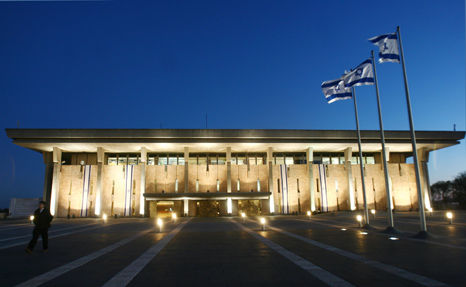Who Will Guard the Guards?
In the article below, IDI Researcher Dr. Chen Friedberg warns that the government's prolonged inability to appoint a permanent head of the Knesset Foreign Affairs and Defense Committee may be causing serious harm to the very foundations of Israeli democracy.

Following his acquittal of charges of breach of trust and fraud in November 2013, Avigdor Liberman was reinstated as Foreign Minister and left his position as Chair of the Knesset's Foreign Affairs and Defense Committee and Sub-Committee on Intelligence and Secret Services. In January 2014, in the absence of agreement by the parties in the coalition regarding who should serve as the new Committee Chair and in order to prevent paralysis of the Foreign Affairs Committee's plenum and of the Subcommittee on Intelligence and Secret Services, the Knesset House Committee amended the Rules of Procedure and granted the Speaker of the Knesset the authority to appoint one of the Committee members as temporary Chair for a period of up to 45 days. As the end of the temporary arrangement approaches, there has been no agreement on the identity of a permanent Chair for the Committee. The Knesset House Committee therefore decided to extend the period during which the Knesset Speaker can exercise his authority to appoint a temporary Chair until May 2014.
During the time that elapsed since Avigdor Liberman left his position as Committee Chair until the end of the original 45-day period that the Knesset allocated for a temporary arrangement, the Committee met only four times (in contrast, when the Committee is functioning normally, it meets once or twice a week). During the same period of time, the Sub-Committee on Intelligence and Secret Services met only once (it too meets once or twice a week under normal circumstances). As a result, the prime minister, the minister of defense, and the heads of the security services, who all regularly appear before the committee, have not done so.
The unique importance of the Foreign Affairs and Defense Committee is evident from a variety of laws, from the Knesset Rules of Procedure, from legal opinions, and from the founding document of the Committee itself. The latter document was written in response to the conclusions of the "Rubinstein Committee," a public committee that examined parliamentary oversight of the defense system and issued recommendations for improvement in 2004. The Rubinstein Committee concluded that the Foreign Affairs and Defense Committee operates as a kind of "mini Knesset," which is devoted mainly to oversight of the defense system and the intelligence bodies that usually operate in secrecy. There is no other body that can oversee the activities of the defense system and intelligence community on behalf of the public. The specific content of the Committee's supervisory activity, however, is not fully available for external review by the press and academia, or even for review by the Knesset Plenum. Accordingly, the public does not have access to information about the decision-making process and the dilemmas at the core of Israel's security operations. This in contrast to other bodies, whose actions are transparent and exposed to the supervision of the Knesset, and—in the absence of Knesset supervision—to the review of the press and the public.
Furthermore, the Foreign Affairs and Defense Committee is responsible for a range of additional areas that are extremely important: approval of legislation, regulations, and orders in the realm of defense (e.g., emergency call-ups of reservists); approval of decisions and actions by the Executive Branch (e.g., declarations of special situations on the Home Front); review of foreign policy and the intelligence system of the State of Israel; review of the work plans of the defense system and the IDF, the Ministry of Foreign Affairs, the National Security Council, and other intelligence and defense bodies subordinate to the Prime Minister's Office; approval of budgets, and so on.
The inability to reach a decision on who will serve as the permanent head of the Foreign Affairs and Defense Committee is causing serious harm to the Committee's ongoing activities (regular meetings, inviting functionaries to report to the Committee and hearing their updates, promotion of laws, setting regulations, and approving various orders). This situation has also harmed the Committee's ability to supervise the Executive Branch in the areas of defense, intelligence, and Israel's foreign relations on a regular and ongoing basis. Since there is no other body that has the authority to supervise the defense system on an ongoing basis on behalf of the sovereign authority – i.e. the citizens of Israel— it is reasonable to argue that the unacceptable situation described above is causing serious harm to the very foundations of Israeli democracy.
